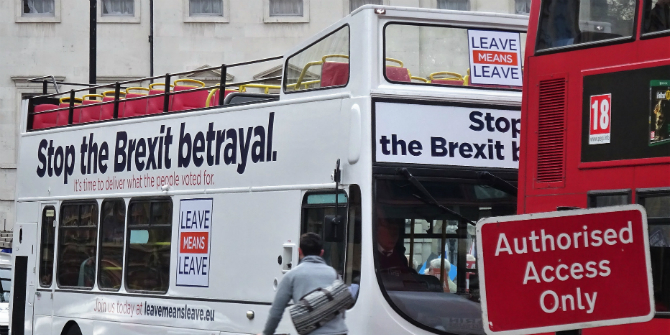Demographics are shifting against ‘Leave’ in any future referendum. British millennials and the following Generation Z (‘zoomers’) were born as Europeans, writes Jeff Frank (Royal Holloway). Is Brexit stealing their future?
Insofar as Brexit is about the colour of our passports and other aspects of national identity, the younger generations see little gain in reverting from European burgundy red to ‘British’ dark blue. They certainly cannot see how the stylistic gain can outweigh the possibility of the loss of free mobile calls, European health insurance and other practical travel concerns. They want the possibility of moving, temporarily or permanently, elsewhere in Europe, and enjoy interacting with Europeans of all nationalities moving here. Recent polls show that a strong majority of those under 35 would vote to remain, while a clear majority of those over 45 would like to leave.
For those of us who are studying inter-generational inequality and in particular the equity issues between the ‘boomers’ and the millennials, it is worth going deeper into whether or not Brexit has major inter-generational distributional effects. ‘Stealing our future’ – applied to both Brexit and the climate emergency – is strong terminology that must involve more than stylistic issues, even to generations raised on social media. David Willetts (in his book The Pinch has emphasised the extensive way in which boomers have ‘stole(n) their children’s future’). Our own book on English universities evidences how the huge indebtedness undertaken by current graduates has come simultaneously with lower education standards and consequently impaired ‘employability’.
Is Brexit one more way in which boomers are harming future generations for their own selfish benefit? To study the effects of Brexit on different demographics or even the economy as a whole, we hit an immediate problem. It is not just a political talking point when the People’s Vote campaign says that, in 2016, no one knew what sort of Brexit they were voting to support or oppose. We still don’t know as we exit the General Election. The current ‘deal’ does not define future trading relations (except for Northern Ireland), either with Europe or across the world. Without getting into the technicalities of the different possibilities, it makes a huge difference whether we have a Brexit that maintains the customs union and/or the single market, or adopts ‘free trade’ between the UK and Europe, and possibly between the UK and the US and other countries, or reverts to WTO tariffs all round in a ‘no deal’ Brexit. Our analysis, therefore, has to be fairly general in nature to encompass all these policy outcomes.
The natural way for an economist to look at inter-generational inequality is by using the ‘overlapping generations model’. Ignoring Gen X (as everybody does), and doing a little violence to the age spans in each generation, we will consider boomers, millennials and zoomers. Millennials are currently working and paying for the pensions and ever-increasing social care burden of the boomers, in the anticipation that zoomers will do the same for them. To a considerable extent, there is a zero-sum game between the generations. If the state pension goes up (as it will under the ‘triple-lock’ guarantee introduced by the coalition government, whatever happens to earnings or inflation), and social care costs inexorably rise with the ageing population, and there aren’t corresponding tax increases paid by better-off boomers, future generations have to pick up the tab. In the same way, failure to invest in infrastructure and protecting the environment benefits boomers at the expense of the millennials and the zoomers: ‘OK, boomer’.
The distinction between intra-generational equity and inter-generational equity can be seen in the example of university fees. If, as Labour proposes, university fees were cut to zero, and this was paid for by higher taxes on the boomers, then it is an inter-generational transfer. But, if the government borrows to fund zero fees, then the cost of the policy is handed back to the younger generations as a whole (rather than just those going to university and currently taking out student loans) – it is an intra-generational transfer from the less well off to the more well off millennials and zoomers.
 Image by Ben Taylor, Some rights reserved.
Image by Ben Taylor, Some rights reserved.
Turning to Brexit, one potential gain rather than a loss for millennials would be an increase in real wages. At first sight, it might seem that Brexit will raise real wages as we send back home the Europeans in our factories, building sites and NHS. Employed millennials would earn more, while retired boomers would pay more for services and – with the transfer from profits to wages – share values and dividends would fall. But this calculus fails to understand that the factor depressing wages is globalisation not immigration. Trade and labour mobility are, in fact, much the same thing. Simply put, a rich country like ours with high capital relative to labour will, in a globalised economy, find a way of importing labour. Via the free movement of labour in the European Union, we can currently bring in textile workers, strawberry pickers, builders and nurses to work here. If that avenue for importing labour is absent, but there is free trade, we can instead import labour embedded in goods. Instead of employing European workers in our textile factories, we will shut the factories and import finished clothes. We will let the strawberry fields go to weed and import strawberries as well as prefabricated buildings. Substituting imported goods for nurses is more difficult, and just means that we will import even more textiles, food and other labour-intensive goods.
In the limit with free trade, we have ‘factor price equalisation’ where workers in the UK receive the same wage as workers in China, even with no immigration at all. If post-Brexit free trade is over the entire world – and in particular encompasses China and Trump’s America, both with low worker rights and weak regulatory standards (including the infamous ‘chlorinated chicken’) – this effect will be magnified and UK wages may fall, without any recourse to assumptions about diminished growth or a potential recession after Brexit.
Those in favour of immigration and the free movement of labour make a further argument about an important difference between importing workers and importing labour-intensive goods – workers pay taxes and use public services. Millennial workers that migrate here contribute to the pensions and social care of the boomers, while having modest recourse to our benefits system. While well-intentioned, this idea of increasing population as a way of forestalling dealing with the impact of an aging population has its own dangers. It only works if the population is continually increasing, a policy solution that is not ideal in times of climate crisis.
The real transfer from millennials and zoomers to boomers arises from the prevalent short-termism in our economy and social structure. If our trade was in balance, the effects of a shift from ‘freedom of movement’ of workers to ‘free trade’ of embedded labour would be modest. But our trade is not in balance. An important accounting rule is that the trade account and the capital account must sum to zero. Simply put, if we run a trade (over goods and services) deficit (almost £40 billion in 2018, or 1.8% of GDP) as part of an overall current account deficit (including other flows abroad, about 4.3% of GDP in 2018), we need to finance that amount by borrowing from abroad. Without a substantive change in policy, it may well be that a move to worldwide ‘free trade’, as envisaged by the Brexiteers, will increase the deficit and hence our borrowing from abroad beyond the current 4.3%.
Simply put, we are spending more than we are earning as a country. Both political parties promise us more spending and borrowing, and the Bank of England promises us continued money supply growth and low-interest rates. It is a topic for another day as to why we are running expansionary monetary and fiscal policies during a period when the economy by any measure is at near full employment. But opening up to worldwide ‘free trade’ and limiting migration can only increase the extent of our borrowing abroad to fund an expanded trade deficit. Ultimately, the millennials or – if the millennials can kick the can down the road – the zoomers will need to repay the debt.
At the end of the day, a small ‘c’ conservative economic policy benefits the millennials over the boomers. Conserving the environment and prudently funding social services and productive public investment, along with high investment in education, setting taxes to cover expenditures and running a sustainable monetary policy, along with maintaining our close relationship with our neighbouring European countries, are the policies that leave the best inheritance for future generations. It is perhaps the final betrayal by the boomers that neither main party offered this menu to the voters.
This post represents the views of the author and not those of the Brexit blog, nor the LSE.







Irrespective of Brexit, the idea that Boomers are always the net gainers is too simplistic. I spent my working life putting money in the bank for my retirement only to find that I am getting a pittance on my savings. There has been a significant shift of wealth from older savers to those who had over large mortgages at the time of the financial crisis.
The author makes some good points. He is right to recognise that immigration only solves the ageing population issue if there is a continuous increase in population. A continuous increase in population is nothing more than a pyramid scheme. The current generation may complain about the situation that the Boomers have bequeathed them but if their solution is to use immigration as a stop gap measure then they would simply be passing on their predicament to some future generation. Eventually it would become ‘standing room only’ on this island; the population expansion would have to stop with a consequence imbalance between generations at that time which would be far greater than the current imbalance.
However, there are many things that the author fails to recognise as I will mention in a further post.
In discussing immigrant labour we must recognise one thing. The substitution of non-European immigration for European immigration is not a like for like substitution. The former must surmount an earnings threshold to enter the country but not the latter (under freedom of Movement) and they potentially have more impact on the earnings of the lower paid in this country.
We have seen a decline in European immigration since the referendum and for last year the ONS reported that the lowest paid occupations enjoying the highest earnings growth. This is as I expected when I voted Leave. It is of course too short a period to draw a firm conclusion but the author seems happy to draw the opposite conclusion in spite of the evidence to date.
The author too only addresses income rather than disposable income. The net immigration over the last 10 years has been around 2.5 million people. If this rise in population has caused rents and house prices to be higher than they would have been under a balanced immigration policy then that influx of people has had a negative effect on the disposable income of the indigenous workers, irrespective of any negative effects on earnings.
If workers are to earn more in real terms then there needs to be an increase in productivity but there is some evidence that employers would prefer to employ a low wage immigrant than to invest in business efficiency. At my local supermarket the automatic car wash stands idle while low wage workers offer car washing by hand. This is a clear example of a reduction in productivity that is replicated across the country. Whether similar effects occur in other other businesses we do not know, because economists do not seem to have studied the issue. It seems to be a matter of faith among economists that immigration is a good thing and they seem reluctant to investigate anything that might disabuse them of that notion.
I challenge the author to respond here to these issues. Why has he ignored the evidence that the lower paid enjoyed the highest earnings growth in 2018? Does he believe that net immigration causes housing costs to rise or not? Does he believe that productivity has been suppressed by low wage immigration or not? Unless he addresses these issues, his post is one-sided and of little value.